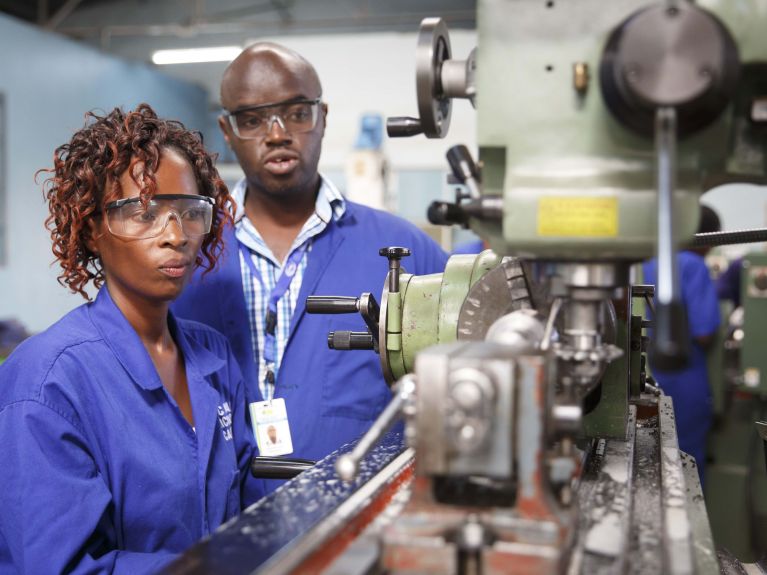Fresh prospects for skilled workers
In Ghana, people interested in working in Germany and Europe receive support at the Centre for Jobs, Migration and Development.

Simon De Daffour now runs a company with four employees. He installs biological treatment plants with connected toilets. In Ghana, this is an important job that improves sanitation and helps protect the environment. Daffour previously lived in Germany for several years. “I wanted to return to Ghana because I wanted to do something to help my country,” he says.

The basis for his success was a course he took lasting a few months in which he learned to build biological wastewater treatment plants. It was the Ghana-European Centre for Jobs, Migration and Development that enabled him to attend this course. It had a different name at the time, however: the Ghana-German Centre for Jobs, Migration and Reintegration. Daffour heard about it on the radio.
The counselling centre opened in the capital Accra in 2017. This type of centre exists not just in Ghana but in eleven other countries, too. They are managed by the Deutsche Gesellschaft für Internationale Zusammenarbeit (GIZ) on behalf of the German Federal Ministry for Economic Cooperation and Development (BMZ). Since February 2023, some of them have reoriented their activities as a result of a paradigm shift in German migration policy: after initially being mainly contact points for returnees like Daffour, they are now increasingly advising people who are interested in migrating to Germany.
Promoting development, attracting labour
The Accra facility has since been renamed. It is also funded by the European Union (EU). The German Ministry of Development is providing 150 million euros for the initiative centres for migration and development. Over a period of three years, the money will go to nine countries of which most already had centres, namely Ghana, Morocco, Tunisia, Egypt, Jordan, Nigeria, Iraq, Pakistan and Indonesia. The aim is to promote economic development in the countries themselves and attract workers to Germany. After all, the Federal Republic urgently needs skilled workers.
Skilled workers like Felix Adjarko, for example. He is an electrical engineer who specialises in renewable energies and is hoping for better training opportunities in Germany than in Ghana. He became aware of the centre through LinkedIn and a friend. At the centre he can get information about what requirements he has to meet so as to be able to live and work in Germany. Adjarko is looking forward to this adventure in another country. But he believes the new language will be a challenge.

“It’s important to acquire language skills to be able to contact employers in Germany,” says Benjamin Woesten of GIZ, who has managed the centre in Accra since 2020 and is now returning to Germany. “We tend to get a lot of young people coming to us who are looking for a perspective.” The counselling is low-threshold, individual and open-ended. The centre counsels about 2,700 people per year. Around 15 percent of the clients were interested in migrating to Germany. Woesten has noticed an increase in demand since the reorientation.
Counselling on living and working in Germany
The centre in Accra is a cooperative venture with the Ghanaian Ministry of Labour. Whether career counselling and further education or help with bureaucratic issues such as applying for a visa: those visiting the centre receive extensive counselling from the six-member advisory team. “On our courses, people learn what it means to live and work in Germany, how things differ from life in Ghana, and what particular points you have to be aware of when dealing with people in Germany,” says Woesten. But the centre also provides information on emigration to other EU and African countries – such as which qualification profiles are currently in demand, says Woesten. In Germany, for example, there are shortages in the areas of social work, STEM (science, technology, engineering and mathematics), the manual trades and healthcare.
Dieses YouTube-Video kann in einem neuen Tab abgespielt werden
YouTube öffnenThird party content
We use YouTube to embed content that may collect data about your activity. Please review the details and accept the service to see this content.
Open consent formThe centre also offers returnees support in setting up their own business and provides psychosocial counselling. “A lot of Ghanaians who come to us previously set off for Germany based on false expectations and promises and attempted to apply for asylum there,” says Woesten. But Ghana is considered safe, so the chances of getting asylum are slim. As Woesten also says: “A lot of them have realised that it’s difficult to gain a foothold in Germany through irregular immigration. Their migration plans didn’t turn out the way they hoped.” Things can potentially go better the second time round. Former returnees can get back in contact with the counselling centre if they wish to go abroad again.



